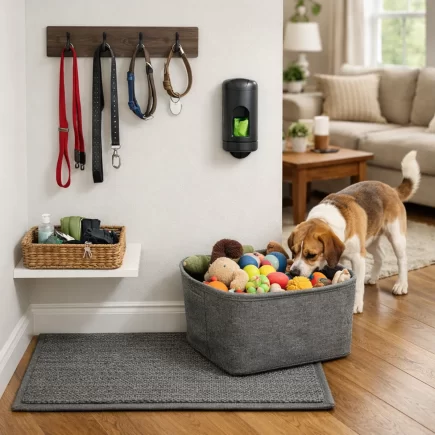Your kids talked you into buying them baby chicks or bunnies for Easter:
Now What?

Chicks and bunnies are synonymous with the Easter holiday. Those cute little baby animals are worldwide symbols of fertility and new life that appears with Spring. Easter falls on Sunday, April 21st this year. Just in time for farm and pet stores to stock their bins with baby bunnies and chicks.
Prepare for your new pets
Giving chicks and bunnies as Easter presents is a long-standing tradition, but not a very good one. This tradition dates back to a time when these animals would be raised on the farm as livestock. Suburban and urban rabbits and chickens are usually considered pets these days. This means they require a higher level of care and have longer life spans.
Generally, it’s a good rule to NOT give live animals as gifts. Fortunately, this trend has died off somewhat in recent years. The sad truth is that thousands of bunnies and chicks are given as Easter gifts every year, only to find themselves dumped at the shelter (or worse) when they are no longer cute fluffy babies and the kids get bored with them. Don’t purchase a live animal as an Easter gift unless you are prepared to care for that animal for the duration of its life.

Ready to have a “Hoppy” Easter?
Bringing home any sort of pet is a big commitment, one that requires research and planning. Chickens and rabbits are both social animals. They thrive and are happiest when they have at least one friend. There are benefits to keeping backyard chickens, namely those delicious free range eggs (they also eat bugs like it’s their job). Bunnies can make great pets for children and adults. They are cuddly and fun when properly socialized. Rabbits can be taught a variety of tricks, including how to use a litter box. Both animals require specialized housing and regular care.

If you’ve been thinking about adding a furry or feathered friend to your family, Easter can be a great time to do it. Spring is when these animals are most readily available in farm and pet stores. Keep reading to make sure you are prepared for the commitment of your new pets and family members.
Welcoming your new pets into the home
Chickens and bunnies are not too difficult to care for, but they do require care. They need safe, secure habitats, appropriate food and bedding, and enrichment to keep them busy and happy. If you just can’t resist those cute little balls of fluff, make sure you’re prepared for the commitment of caring for them. Check out our prefab chicken coops and rabbit hutches to help you get started.

Caring for Chickens
Chickens can make great additions to any home, and in many places, are even legal to keep within city limits (although roosters generally are not allowed). Your chickens will need a chicken coop to lay their eggs and to keep them safe from predators. Chickens can be let out during the day to roam your backyard. They will eat tons of bugs, seeds, and anything else they can find. Many chickens will naturally return to their coop at night to roost, although you may need to teach them to do so at first. Always be sure to lock the coop at night to prevent predators from breaking in.

Creature Comforts
Most chickens begin laying eggs at around 6 months of age, and will lay an average of 5 eggs a week. A chicken coop with a designated nesting box will provide your chickens with a secure place to lay their eggs. This gives you an easy and consistent place to collect those eggs from. Most nesting boxes are easily accessible with a hinged roof for easy egg collection. You will want to check the nesting box daily for eggs. Line the nesting boxes with straw or other soft material to encourage your chickens to nest and lay inside the box. Learn more about setting up your nesting boxes here.
Your chickens will need access to dry dirt or sand for dust baths, fresh drinking water, and a steady food supply. While your chickens will find plenty of things to eat in your garden, you will want to supplement their diet. Chickens can eat kitchen scraps such as fruits and vegetables; cooked beans, pasta, and rice; bread, nuts and seeds. You can also purchase poultry pellets to feed your chickens, which is essentially chicken kibble and will provide them with the balanced nutrients they need.

You will also need to clean the chicken coop regularly. Chickens are relatively indiscriminate when it comes to relieving themselves; in other words, they will poop in the coop! Fortunately, many of our coops come with a slide out tray that will collect droppings and can be easily pulled out and hosed down. Be sure to change the straw and bedding once a week. The coop should be deep cleaned at least once a month. Get more chicken raising tips and tricks from mypetchicken.com.
Chicken Coops
Check out these chicken coops and more, available right now on Aosom.com:
Caring for Rabbits
Choosing the right breed
There are over 60 breeds of domesticated rabbits in the world. Choosing the right breed of bunny for your family is important. Some of the most popular breeds include the Lionhead, the Flemish Giant, and the Holland Lop. All of these bunnies vary greatly in size, appearance, and personality, so be sure to do your research before bringing a bun home! You can learn more about rabbit breeds on Rabbitpedia.com.

Rabbits require a rabbit hutch enclosure, whether they live inside the house, garage, or in the backyard. The hutch should be large enough for your bunny to comfortably stand up and move around. Rabbits need fresh hay and bedding inside their hutch. You will need to clean the hutch regularly, at least once a week. Most of our hutches feature slide-out trays to make daily clean up easier.
Your bunny will need access to fresh water and food every day. You can purchase rabbit pellets at your local feed and farm supply store. You can also offer you bunny fresh green vegetables as a snack or treat.
Have fun with your bun
Rabbits also need socialization and enrichment. If you get your bunny from a home pet rabbit breeder, the babies will already be socialized with humans. To grow your bond with your pet bunny, make sure to interact with him every day. Bunnies are very social animals and love to cuddle. Sitting on the floor and letting your rabbit approach you for playtime and snuggles is the best way to interact with him. Rabbits are ground dwelling, burrowing animals that do not like to be picked up and carried around, as being high up is very uncomfortable for them. Your bunny will enjoy roaming around the house, so make sure to bunny proof your home. Get more useful tips and tricks to socialize your bunny here.

Pet rabbits will need veterinary care. It’s a good idea to spay or neuter your rabbit, just like a cat or dog. You may need to seek out a specialty vet who is knowledgeable about rabbit care.
Rabbit Hutches
Check out these rabbit hutches and more, available now on Aosom.com:
Play and Win!
Want more Easter fun? Be sure to play our Easter Egg Hunt Game on the Aosom homepage for a chance to win some great prizes, including one of our rattan sets. Just in time for spring!


































